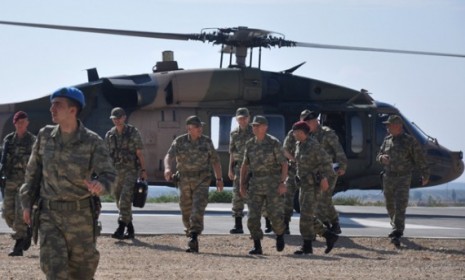Is Turkey trying to start a war with Syria?
Syria and Turkey have been exchanging mortar blasts across their shared border for six days, but it's not quite clear who's the aggressor

A free daily email with the biggest news stories of the day – and the best features from TheWeek.com
You are now subscribed
Your newsletter sign-up was successful
Tensions are continuing to rise on the Syria-Turkey border, where the two countries have been trading mortar blasts for six days. NATO Secretary General Anders Fogh Rasmussen said Tuesday that the alliance had prepared plans in case it needs to step in and defend Turkey, a NATO member. Turkey's leaders, seeking support to push out Syrian President Bashar al-Assad, have repeatedly warned the U.S. and other allies that the fighting within Syria could spill over and cause a regional war. Turkish President Abdullah Gul said Monday that the "worst-case scenarios" were now starting to appear. Is Turkey just trying to protect its own people, or is it picking a fight to hasten Assad's demise?
Turkey's pushing for war: Turkey "exploited the mortar attack on a Turkish border town," says Kaveh L Afrasiabi at Asia Times, without even knowing whether Syria's government or rebels were behind it. "Instead of a measured, level-headed response," Prime Minister Recip Tayyip Erdogan "rushed lawmakers into giving him carte blanche" to attack Syria. It's probably part of "a concerted effort to secure a 'safe haven' for Syrian rebels along the border," and drag NATO deeper into the fight against Assad.
"Turkey shows double duplicity on Syria"
The Week
Escape your echo chamber. Get the facts behind the news, plus analysis from multiple perspectives.

Sign up for The Week's Free Newsletters
From our morning news briefing to a weekly Good News Newsletter, get the best of The Week delivered directly to your inbox.
From our morning news briefing to a weekly Good News Newsletter, get the best of The Week delivered directly to your inbox.
Syria's the one provoking a fight: These cross-border skirmishes do look like an "intentional escalation," says Elizabeth A. Kennedy of The Associated Press, but Syria's the one pulling the strings. Damascus is sending the message that "the crisis is simply too explosive to risk foreign military intervention." Nobody wants a broader war — least of all Turkish civilians — so "the spillover of fighting is giving new life to a long-shot political solution" that lets Assad's cronies keep some power.
"Reason for Syria strikes on Turkey is apparent"
Both sides are rushing into this war: "Bashar al-Assad is a despot, his regime is awful," says Robert Fisk at the Belfast Telegraph, but it's a bit of a distortion to portray "plucky little Turkey" as a helpless victim. It's "hosting the opposition to the Syrian regime" and "funneling weapons and armed men across the border" to help topple Assad. Plus, most of the shelling is taking place in a part of Turkey that belonged to Syria until 1939. As usual, the story is more complicated than the headlines suggest.
"Plucky Turkey standing up to evil Syria? It's not as simple as that"
A free daily email with the biggest news stories of the day – and the best features from TheWeek.com
-
 How the FCC’s ‘equal time’ rule works
How the FCC’s ‘equal time’ rule worksIn the Spotlight The law is at the heart of the Colbert-CBS conflict
-
 What is the endgame in the DHS shutdown?
What is the endgame in the DHS shutdown?Today’s Big Question Democrats want to rein in ICE’s immigration crackdown
-
 ‘Poor time management isn’t just an inconvenience’
‘Poor time management isn’t just an inconvenience’Instant Opinion Opinion, comment and editorials of the day